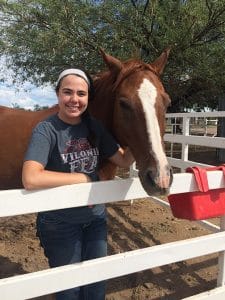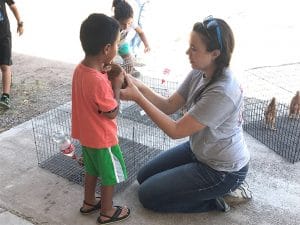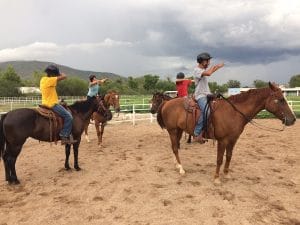 Taylor McNeel, a senior Agriculture Business major at Southern Arkansas University, got the opportunity this past summer to put her Spanish-speaking skills to work as well as her desire to serve others at an orphanage in Mexico.
Taylor McNeel, a senior Agriculture Business major at Southern Arkansas University, got the opportunity this past summer to put her Spanish-speaking skills to work as well as her desire to serve others at an orphanage in Mexico.
McNeel was able to travel to Magdalena, Sonora, on an internship she obtained through The Fatted Calf, a non-profit organization that provides training and career development to the fatherless and less-privileged of Mexico. “It is a group home where children are placed through foster care,” McNeel said. “I found out about The Fatted Calf through Future Farmers of America. Because I’m majoring in agribusiness and minoring in Spanish, they would tell me that I really needed to pursue an internship in Mexico. It sounded pretty perfect.”
McNeel, a former state and national president of FFA, said she applied for the internship in December 2016 and was accepted a few months later. She left initially for Sonora in May, but had to return for a few weeks due to a prior obligation. She returned to the group home to continue her work in July.
A team of U.S. missionaries established a “4-H-type experience” for the 50 or so children who live in the home. “The Fatted Calf provides work opportunities for these children. There is a farm and a meat-processing business that provides jobs for older residents of the orphanage.”
It helps give them confidence and a sense of responsibility.
The Fatted Calf interns come in the summer to teach classes in agriculture and other technical skills. “I taught a woodworking class, public speaking, and working with horses and chickens,” McNeel said. In just five weeks, the interns prepared the children to participate in Expo Esperanza, or “Hope Expo,” which she described as similar to a county fair.
“It helps give them confidence and a sense of responsibility,” McNeel explained.
Magdalena is located about three hours south of Tucson, Arizona. McNeel said it was her first time traveling to Mexico.

Her experience in Magdalena “exposed me to the experience of living in a foreign country and speaking Spanish to Hispanics in their country,” she said. “I also got a chance to understand how agriculture works in Mexico and how products there are exported across the border. I think that understanding those relationships will benefit me down the road.”
McNeel accompanied four other interns to Mexico and lived on a campus encompassing several different group homes, a school and a church. “We lived in co-ed dorms, and the students we worked with were ages 6 to 18. A lot of these students were lacking in confidence, the ability to make decisions, so it was incredible to put them in a learning situation with animals, in which they had to build trusting relationships and be able to work with those animals.”
She’d call me over to help, and one day she picked up the horse’s foot and said, ‘Look!’ It was enough just to see the excitement on her face to be able to do that.
In shop classes, the children were taught to overcome their fear of working with tools, and indeed learned how to operate machinery and equipment used in woodworking. “In the short time I was there, I was able to see the progression, and they will continue to develop,” she said.
One child worked with a horse that liked to kick its rear legs, McNeel said. “She’d call me over to help, and one day she picked up the horse’s foot and said, ‘Look!’ It was enough just to see the excitement on her face to be able to do that.”
McNeel said she was able to take skills she learned in shop classes in high school and at SAU, translate them into Spanish and teach them to young children.
“Magdalena is a town of about 20,000 people, but it reminded me a lot of Magnolia,” she said. “We lived 5-10 minutes outside town, but we would go into town a few times a week. In general, everyone in Mexican culture is very nice. People will stop and help you. I was very appreciative.”

She also learned that “textbook Spanish” isn’t necessarily spoken in Mexico. “In the academic setting, you learn general Spanish, but in that part of Mexico, they’ll phrase things differently or use different words. They’ll say, ‘we don’t use that term,’ or, ‘they use it in South America.’ It gave me a real understanding of where I am in learning Spanish.”
At the end of the five weeks, the children and interns participated in the Expo. “They could exhibit their projects, from cookies to electronics to livestock.”
Arts and crafts; the performing arts; stage acting; games and activities and fair food were all part of the Expo. “It was cool to see the students set goals and strive to meet them,” McNeel said. “The entire goal of the summer was to have a project to enter in the fair. I taught woodworking, and that means teaching them tool identification, safety rules, and going over all the equipment and how each piece of it works. They got to drill, hammer nails, sand wood, and do their own projects.”
Older students were given plans for wood projects and allowed to “work their way through and ask questions. They built toolboxes and birdhouses, picture frames and candle holders. They had a fully furnished shop that was used in the repair or construction of houses, so all the equipment was available.”
“I hope to stay connected to the students and the mission,” McNeel said. “They have made it known that we are welcome back. I hope to be able to go again.”
McNeel is a native of Vilonia, Arkansas.
